Introduction
In a world where health and wellness are paramount, structured professional weight management programs emerge as a vital resource for organizations seeking to enhance their employees' well-being. These initiatives go beyond mere diet and exercise; they encompass personalized strategies that empower individuals on their journey to healthier living.
With the alarming statistics surrounding obesity, especially among older adults, the time has come for HR Benefits Managers to take decisive action. By investing in comprehensive weight management solutions, companies can not only support their teams in achieving their health goals but also cultivate a thriving workplace culture that prioritizes wellness.
This article explores the essential components of effective weight management programs, the crucial role of healthcare professionals, and the impact of behavioral interventions, all while highlighting the transformative potential of these initiatives in fostering a healthier, more engaged workforce.
Understanding Professional Weight Management Programs
Organized professional weight management programs serve as a beacon of hope for individuals striving to maintain a healthy figure. The loss industry is increasingly focusing on personalized solutions, such as tailored diet plans and targeted exercise programs, which are essential components of these comprehensive initiatives. By investing in Foresight Health Coaching’s corporate partnership, organizations can empower their staff with essential resources that support a balanced weight journey, including:
- Regular assessments
- Personalized plans
- Ongoing assistance from dedicated wellness coaches
Our optimized wellness and fitness program is improved by an interactive app that simplifies organization, enabling employees to connect with their wellness objectives effortlessly. This app features:
- Goal tracking
- Personalized reminders
- Access to resources that make healthy living more achievable
Notably, science-backed, inclusive, and technology-driven approaches are crucial in addressing global wellness challenges, particularly as statistics reveal that in 2019, 28.5% of adults aged 65 and older in the United States were classified as obese.
Implementing structured professional weight management initiatives not only enhances individual well-being but also fosters a vibrant culture of wellness within the workplace. This commitment to employee wellness reflects an organization's dedication to fostering a supportive environment, ultimately leading to a more engaged and healthier workforce. Now is the time for HR Benefits Managers to champion these initiatives—take the first step towards a healthier, happier team by exploring our free 7-day trial of our transformative health coaching app today!
To get started, contact us at info@foresighthealthcoaching.com or visit our website to sign up.
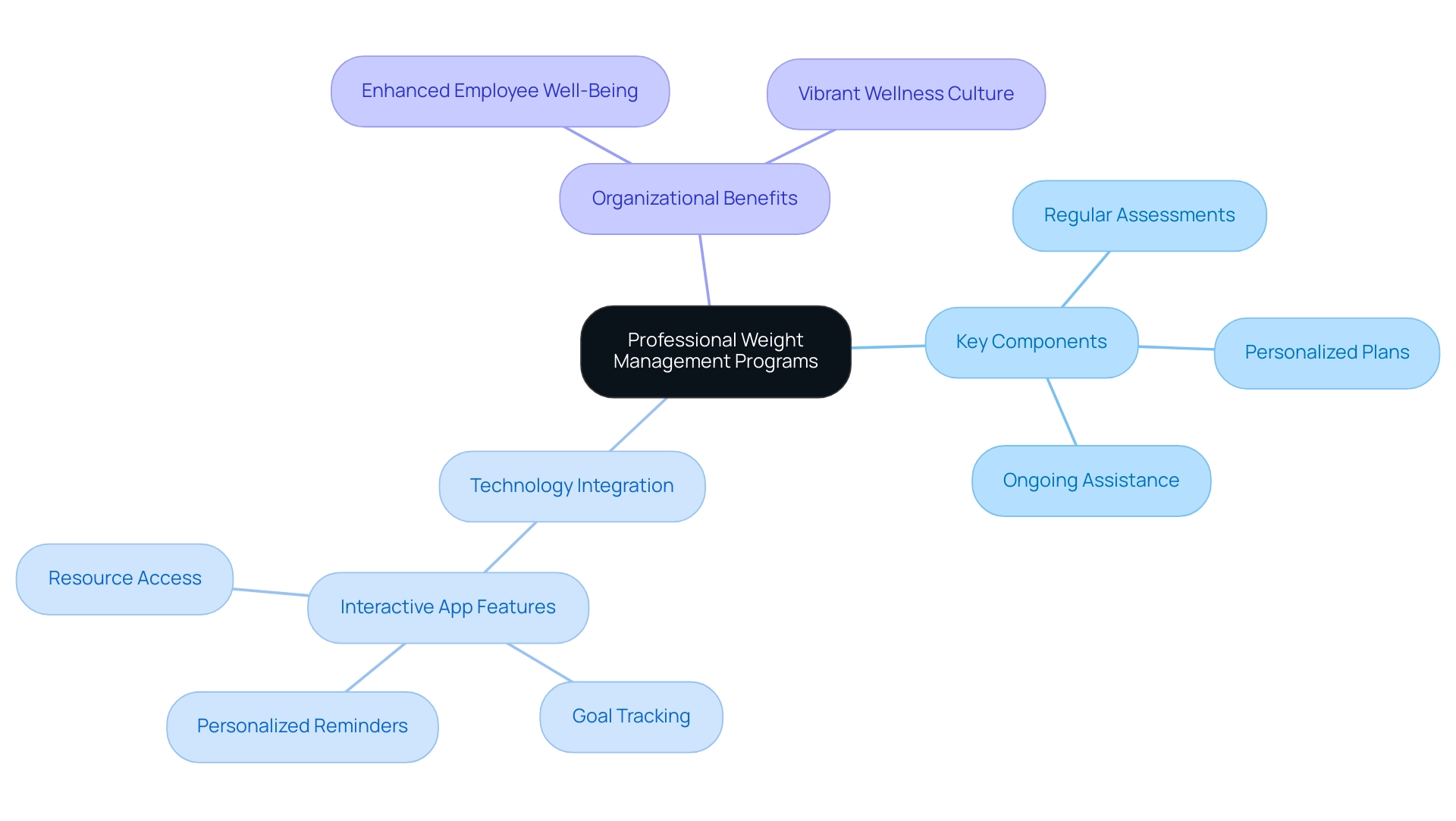
Key Strategies for Effective Weight Management
Effective professional weight management requires a comprehensive approach that marries lifestyle adjustments with medical interventions when needed. A cornerstone of this strategy is Nutrition Education. Foresight Health Coaching provides tailored resources and engaging workshops on healthy eating, leading to meaningful changes in dietary habits among employees.
Alarmingly, data reveals that one in five adults (20.6%) consumed vegetables less than once daily in 2021, highlighting a significant opportunity for improvement.
In the context of workplace wellness initiatives, the Healthy People 2030 objective NWS-04 aims to reduce the proportion of children and adolescents with obesity, emphasizing the importance of addressing obesity at all levels, including within organizations.
Physical Activity Programs are equally crucial. By promoting regular exercise through structured group activities or fitness challenges, Foresight can enhance motivation and foster a sense of community among participants, essential for sustaining long-term wellness changes.
Additionally, Goal Setting plays a vital role in the weight management journey. Establishing clear, achievable objectives allows employees to monitor their progress, ensuring they remain focused and motivated. Research has shown that 88.5% of women who completed month 12 testing in a nutrition education trial were compliant, underscoring the effectiveness of Foresight's structured programs.
Moreover, a study measuring biochemical markers of well-being found no significant changes in cholesterol or glucose levels, indicating the need for continuous evaluation of such programs to ensure they effectively support participants' wellness.
Finally, implementing Monitoring and Feedback mechanisms through regular check-ins and assessments not only keeps individuals accountable but also facilitates necessary adjustments to their plans. As highlighted by Sharon M Nickols-Richardson, 'Nutrition education is a key element in promoting professional weight management.' By integrating these strategies through Foresight Health Coaching’s tailored programs, including in-person wellness talks, comprehensive pantry and nutrition services, and access to our health and wellness app, organizations can cultivate a supportive environment that champions professional weight management and effective body composition regulation. The scalability of our corporate membership based on the number of staff ensures that businesses of all sizes can benefit from these initiatives, ultimately enhancing the well-being of their workforce.
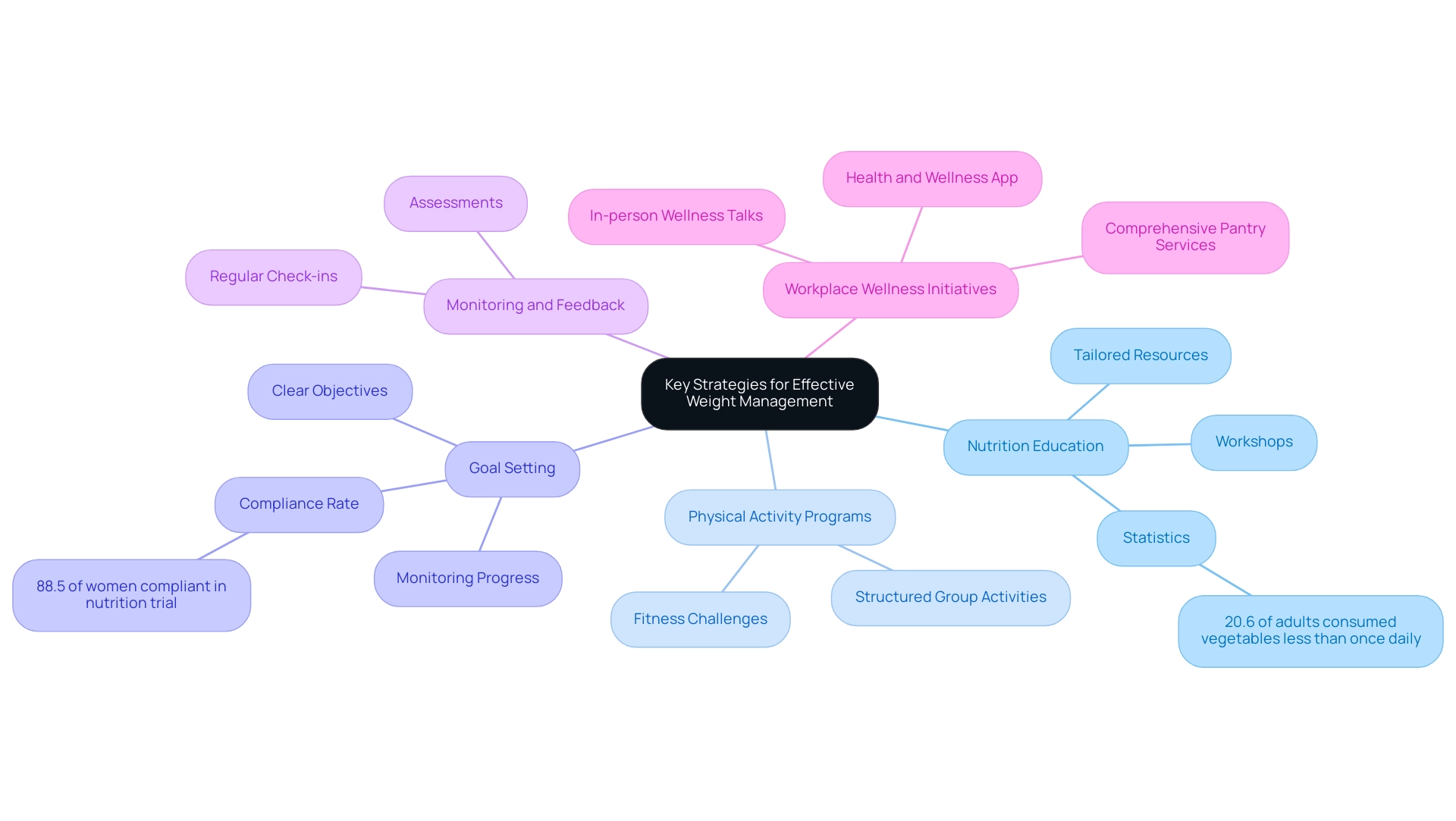
The Role of Healthcare Professionals in Weight Management
Healthcare experts are crucial partners in the process of effective health control in the workplace. As Kimberly A Gudzune states, the collaboration between healthcare professionals and staff is vital for developing professional weight management strategies. This is where Foresight Health Coaching excels, leveraging its partnerships with top firms and businesses, showcased through their logos, to provide custom health coaching services.
Their ability to deliver personalized assessments and tailored guidance is invaluable. By collaborating with dietitians, nutritionists, and fitness trainers, these specialists can develop personalized plans that address the unique needs of each staff member. Such tailored strategies not only inspire individuals but also promote accountability, as regular consultations ensure that team members remain on track and make informed choices.
Additionally, healthcare professionals can identify underlying medical issues that may impact professional weight management, ensuring a comprehensive approach to health management. Key services such as metabolic, fitness, or body composition testing, as well as online self-monitoring programs, can further enhance these strategies. Integrating these experts into workplace wellness programs focused on professional weight management significantly increases the likelihood of success for employees.
A recent statistical analysis of participant responses highlighted the positive relationship between participant satisfaction and the quality of healthcare professional involvement, reinforcing the importance of these collaborations. Testimonials from satisfied clients further emphasize the effectiveness of these coaching services. In 2024, prioritizing the inclusion of healthcare professionals within your wellness initiatives is not just beneficial—it's a powerful step towards fostering a healthier, more engaged workforce.
Contact Foresight Health Coaching today to explore how we can support your organization in achieving its health goals.
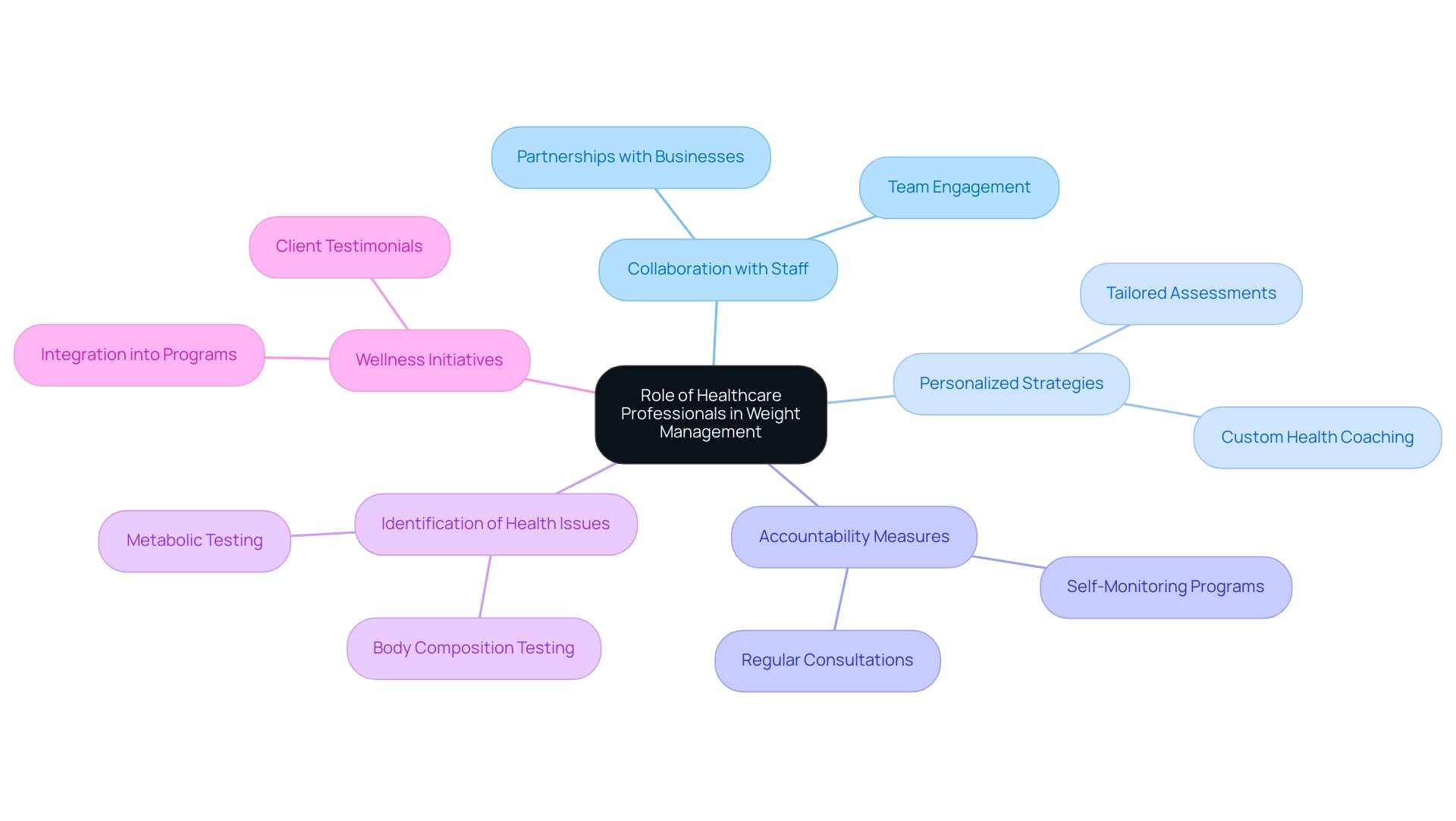
Behavioral Interventions and Support Systems for Success
Behavioral interventions play a vital role in successful body control by addressing the psychological factors that influence eating habits and physical activity. Implementing effective strategies can empower individuals and drive lasting change. Key interventions include:
-
Cognitive Behavioral Therapy (CBT): This evidence-based approach helps individuals recognize and modify negative thought patterns related to food and self-image.
As observed by Dr. Carlos M. Grilo from Yale University, given findings from RCTs that binge remission was linked to greater reductions, the comparison to sequential CBT+BWL treatment supports the notion that once CBT alleviates binge eating and related psychological issues, patients can attain significant loss through behavioral weight loss (BWL) programs. This highlights the efficacy of CBT in controlling body mass. Moreover, a review by Gautam et al. (2020) emphasizes the significance of comprehending the psychological elements of body control, highlighting that tackling foundational problems can result in more enduring outcomes.
-
Support Groups: Establishing peer support networks within the workplace can greatly improve motivation and accountability among staff. These groups cultivate a sense of belonging, motivating individuals to share their challenges and achievements, which can result in heightened dedication to health goals.
-
Incentive Programs: Providing rewards for attaining health milestones can serve as a strong motivator. This strategy not only enhances engagement but also strengthens positive behavior changes, promoting participation in wellness initiatives.
-
Regular Workshops: Hosting seminars centered on stress control and lifestyle modifications provides employees with knowledge and tools to make healthier choices. These workshops can also tackle emotional eating and other challenges that obstruct efforts to control body mass.
By integrating these behavioral interventions, organizations can cultivate a supportive environment that significantly enhances the likelihood of successful professional weight management. As highlighted in recent studies, over 80% of patients who participated in follow-up assessments benefited from these approaches, demonstrating the positive impact of structured support systems. Moreover, recognizing the constraints of previous research, such as the necessity for varied populations in studies, promotes future inquiries into the long-term impacts of cognitive behavioral therapy in controlling body mass, ultimately broadening the evidence base for these interventions.
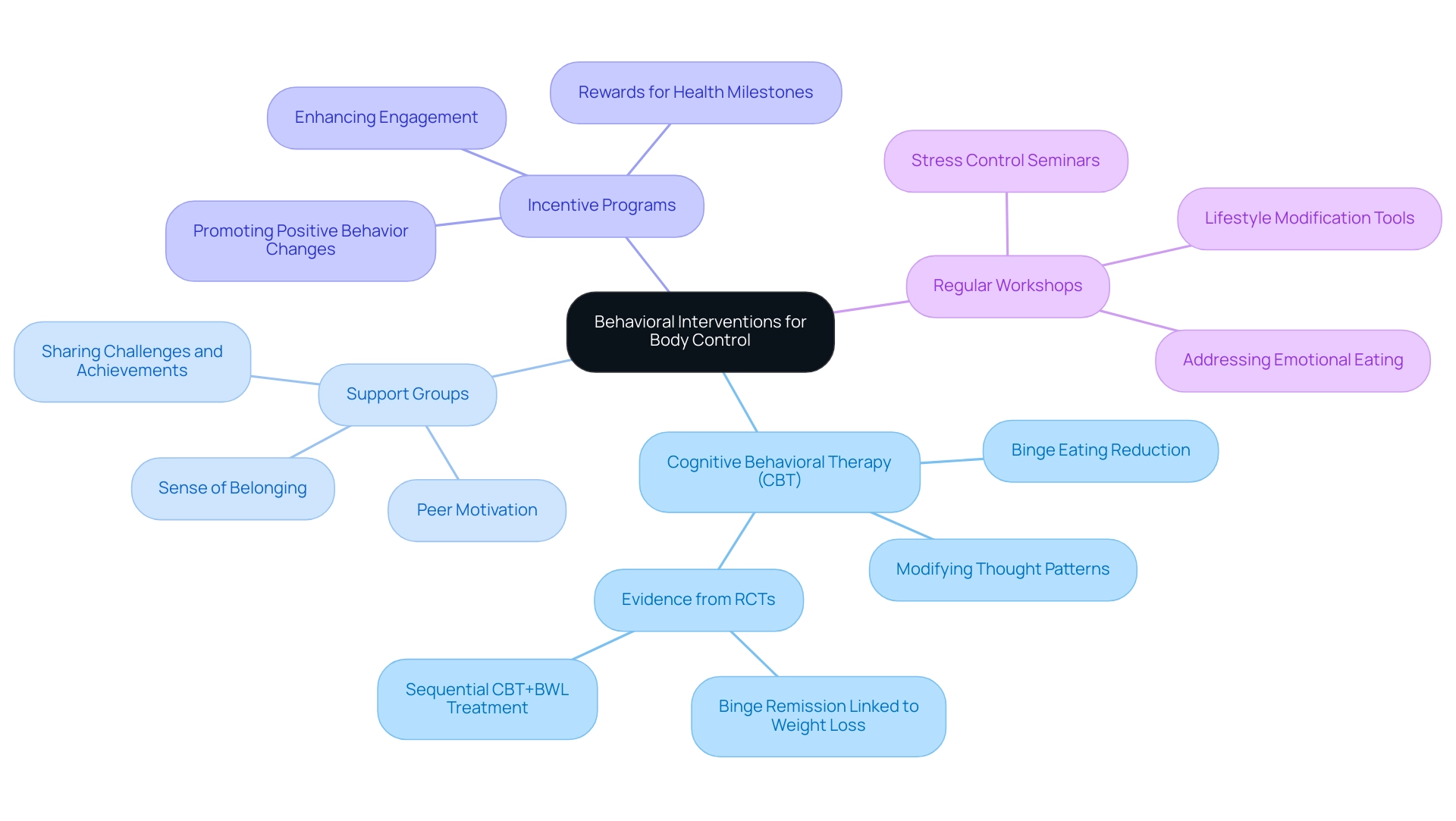
The Health Implications of Effective Weight Management
Effective body management plays a crucial role in reducing the risks associated with chronic conditions such as diabetes, heart disease, and hypertension. Research indicates that maintaining a healthy body mass significantly improves overall quality of life while also lowering healthcare costs linked to obesity-related illnesses. Notably, the annual likelihood of achieving a loss of 10% or greater stands at 1 in 24 individuals, underscoring the challenges many face in this endeavor.
The research named Public Well-being Implications of Loss Discoveries highlights these challenges, emphasizing the need for effective public strategies to support individuals with excess mass or obesity in achieving clinically significant loss. Moreover, it is crucial to acknowledge that:
- Men frequently concentrate on exercise solely for loss,
- Women usually highlight nutrition,
which can affect the efficiency of reduction strategies. Effective control of body mass not only improves physical condition but also increases energy levels, productivity, and mental wellness.
Organizations that actively implement professional weight management initiatives support their employees' well-being and cultivate a more engaged and motivated workforce. As Simon J. Russell noted, 'These authors jointly supervised this work,' reinforcing the collaborative effort needed in addressing these public health concerns. By prioritizing these initiatives, HR leaders can foster a healthier workplace, ultimately leading to improved outcomes for everyone involved.
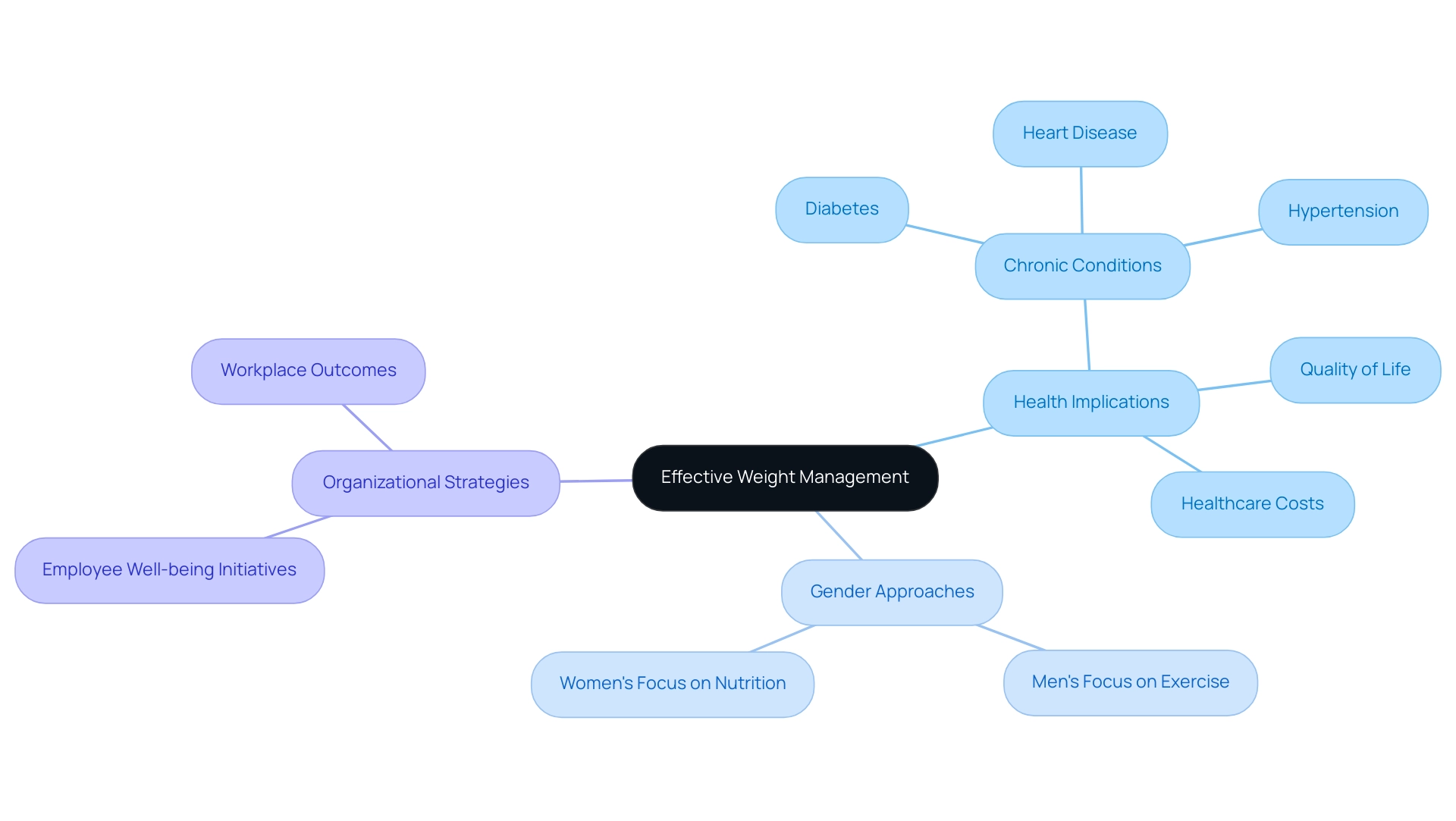
Conclusion
Structured professional weight management programs are essential for fostering a healthier workplace culture and improving employee well-being. These initiatives encompass personalized strategies, including:
- Tailored diet plans
- Physical activity programs
- Ongoing support from healthcare professionals
By investing in comprehensive solutions, organizations can empower their employees to take charge of their health, leading to reduced obesity rates and enhanced quality of life.
The integration of effective strategies—such as:
- Nutrition education
- Goal setting
- Behavioral interventions
plays a pivotal role in the success of weight management efforts. By addressing both the physiological and psychological aspects of weight management, organizations can create an environment that encourages sustained engagement and accountability. The involvement of healthcare professionals further elevates these programs, ensuring that employees receive the guidance and support necessary to achieve their health goals.
Ultimately, the commitment to structured weight management programs not only elevates individual health but also contributes to a more productive and motivated workforce. As organizations prioritize the well-being of their teams, they pave the way for a thriving workplace culture that values health and wellness. Now is the time for HR Benefits Managers to champion these transformative initiatives, taking proactive steps towards a healthier future for their employees and the organization as a whole.




